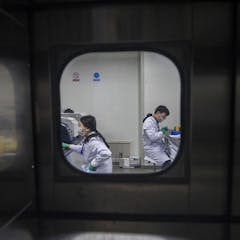
Articles on Research ethics
Displaying 1 - 20 of 84 articles

Substantial economic growth in the psychedelic drugs market has drawn interest from corporations and start-ups. While this may accelerate research, it also sparks concerns about conflicts of interest.

There are several reasons why ethical conduct in scientific research is so important.

Translation involves more than just transferring words from one language to another. Better translations of study materials can improve both the diversity of study participants and research results.

As well as the important ethical reasons for minimising animal use in research, the reality is sometimes animals just aren’t that good at predicting human responses.

Hopefully more curators and custodians of repositories of human skeletal remains will attempt to redress some of the wrongs of the past.

Scientists can create viable eggs from two male mice. In the wake of CRISPR controversies and restrictive abortion laws, two experts start a dialogue on ethical research in reproductive biology.

Biobanks collect and store large amounts of data that researchers use to conduct a wide range of studies. Making sure participants understand what they’re getting into can help build trust in science.

Environmental DNA provides a wealth of information for conservationists, archaeologists and forensic scientists. But the unintentional pickup of human genetic information raises ethical questions.

Pausing AI development will give our governments and culture time to catch up with and steer the rush of new technology.

Following the controversial births of the first gene-edited babies, a major focus of the Third International Summit on Human Genome Editing was responsible use of CRISPR.

Although there are rules that govern animal research, they don’t answer one important question: when are the gains from research enough to justify the harms it may inflict?

Guidelines and regulations weigh the medical and health benefits of animal research with researchers’ ability to ensure humane care of their subjects from start to finish.

Genetic research is big business and has yielded life-saving treatments. But experts are warning of caution about ‘gain of function’ research that has the pandemic potential.

Nature’s recent efforts to redefine the ethical responsibilities of scientists leave a lot to be desired.

Thousands of ancient genomes have been sequenced to date. A Nobel Prize highlights tremendous opportunities for aDNA, as well as challenges related to rapid growth, equity and misinformation.

Researchers have a number of responsibilities when embarking on their work - not least of all to the participants.

Researchers in sub-Saharan Africa ought to fuse conventional Western theories of knowledge and local theories of knowledge.

Existing genetic data and sequencing tools are overwhelmingly based on people of European ancestry, which excludes much of the rich genetic variation of the world.

The movement to change the way researchers are measured should undoubtedly be embraced.

The South African Khoe-San communities are no strangers to exploitative research. One research team is trying to provide genetic ancestry results to community members. But they still face many challenges.
